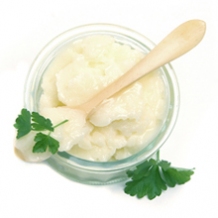Nutrition And Health
Nutrition And Health
British food-lovers are quickly discovering the culinary benefits of cooking with goose fat, not least for making the best-tasting roast potatoes. However, it’s a little known fact that as well as tasting great, goose fat is also good for you in comparison to other animal fats. It is high in 'heart healthy' monounsaturated fats which can lower blood cholesterol level.
As with all fats, goose fat is a good source of energy; 1 gram of fat provides 9 Kcal. Government guidelines recommend that fats make up a third of our diet. For the average woman this means about 76g a day; for men, roughly 100g.
- Fat is an essential part of any balanced diet. It provides the body with the fat-soluble vitamins A, D, E and K; which are essential for growth; and contains essential fatty acids which are important in maintaining normal health and body functions.
- Although animal fats are often considered to be ‘bad fats’, goose fat is one of the better ones and contains far fewer saturated fats than butter or lard. Goose Fat contains 32.7g Saturated Fat per 100g compared with 54g for Butter and 40.8g for Lard.
- Goose Fat is high in ‘heart healthy’ monounsaturated (55g compared to 19.8g in butter) and polyunsaturated fats (10.8g compared to 2.6g in butter).
- Goose Fat is also rich in Oleic acid C18.1 (a specific type of monounsaturated fatty acid) which can lower blood cholesterol levels. Goose Fat contains on average 58% oleic acid, C18.1, and is generally higher in comparison to other animal fats.
Understanding the Different Types of Fats
In simple terms, fats that have the highest degree of saturation are the fats that are most likely to raise the level of bad cholesterol. Raised levels of blood cholesterol can in turn lead to an increased risk of Coronary Heart Disease.
- Consumption of saturated fats, which are found mainly in meat and dairy products should be limited to avoid increasing the risk of cardiovascular disease. Saturated fats are solid at room temperature
- The two types of unsaturated fats: polyunsaturated and monounsaturated are healthier than saturated fats. These are liquid at room temperature.
- Monounsaturated fats can help to lower levels of unhealthy blood cholesterol. For more information visit the British Nutrition Foundation’s website at www.nutrition.org.uk
There are three types of fat; saturated, polyunsaturated and monounsaturated fatty acids, all of which are classed according to their degree of saturation .A fatty acid is saturated when all the available carbon bonds are occupied by a hydrogen atom. Goose Fat, like most foods contains all three fats in varying proportions.
| Fat Data - Comparison of Nutritional Values Typical values per 100g | ||||
Fat content | Saturates | Monounsaturates | Polyunsaturates | |
| Butter | 81.50% | 54g | 19.8g | 2.6g |
| Beef dripping | 100% | 54.8g | 36.7g | 2.5g |
| Lard | 100% | 40.8g | 43.8g | 9.6g |
| Suet (shredded) | 100% | 48g | 32.1g | 2.1g |
| Compound Cooking Fat | 100% | 38.1g | 45.6g | 11.1g |
| Goose fat | 100% | 32.7g | 55g | 10.8g |
| Duck fat | 100% | 26.9g | 57g | 11g |
-

Nutrition & Health
-

Nutrition & Health
